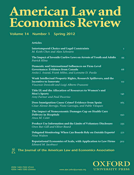
American Law and Economics Review
Scope & Guideline
Advancing Knowledge at the Intersection of Law and Economics
Introduction
Aims and Scopes
- Economic Analysis of Legal Institutions:
The journal explores how economic principles can elucidate the functioning and efficiency of legal institutions, including courts, regulatory bodies, and enforcement mechanisms. - Behavioral Economics and Law:
A significant focus is on the implications of behavioral economics for legal outcomes, examining how cognitive biases and preferences influence legal decision-making and conflict resolution. - Regulatory and Compliance Issues:
The journal addresses various aspects of regulatory enforcement, including the effectiveness of regulations and compliance strategies in promoting legal and economic efficiency. - Impact of Legal Decisions on Economic Behavior:
Research often investigates how legal rulings and policies affect economic behaviors, such as market dynamics, consumer rights, and corporate governance. - Interdisciplinary Approaches:
The journal encourages interdisciplinary studies that integrate insights from economics, law, psychology, and sociology to understand complex legal phenomena.
Trending and Emerging
- Regulatory Enforcement Mechanisms:
Recent publications emphasize optimal regulatory enforcement strategies, reflecting a growing concern for how regulations can be effectively implemented and enforced in various sectors. - Conflict Resolution and Mediation:
There is an emerging interest in the role of mediators and the impact of biases in conflict resolution, highlighting the importance of understanding interpersonal dynamics in legal disputes. - Consumer Rights and Market Behavior:
The journal has seen a rise in studies related to consumer rights, particularly in the context of imperfect information and its implications for market efficiency and fairness. - Gender and Diversity Issues in Law:
Research exploring gender discrimination and diversity within legal frameworks is gaining traction, pointing to a broader societal emphasis on equity and representation. - Impact of Societal Changes on Legal Systems:
Themes examining the effects of societal changes, such as the COVID-19 pandemic on domestic violence or regulatory responses, indicate an adaptive focus on contemporary legal challenges.
Declining or Waning
- Traditional Legal Doctrines:
There seems to be a waning interest in purely doctrinal analyses that do not incorporate economic principles or empirical evidence, with a shift towards more integrative approaches. - Historical Legal Analysis:
Papers focusing on historical perspectives of law without strong economic analysis have decreased, indicating a move towards contemporary and applied legal issues. - General Legal Theory:
Research that remains purely theoretical without empirical backing appears to be less frequent, as the journal favors studies that provide concrete data and practical implications.
Similar Journals

Access to Justice in Eastern Europe
Advancing Understanding, Enhancing Access.Access to Justice in Eastern Europe is a pivotal journal published by the EAST EUROPEAN LAW RESEARCH CENTER that aims to enhance the understanding and discourse on legal access and justice systems within Eastern Europe. Since its inception in 2018, this open-access journal has made its valuable contributions freely available, fostering an inclusive academic environment for researchers, professionals, and students alike. With an impressive Q2 ranking in the field of Law and a notable Scopus Rank of #477 out of 1025 in the Social Sciences, this journal plays a crucial role in influencing policy and practice through evidence-based research. Addressing the nuances of legal access, the journal covers diverse topics including legal frameworks, social justice, and the impact of law on marginalized communities, with contributions from both local and international scholars. With an ongoing annual volume that extends to 2024, it serves as a vital resource for those committed to the advancement of justice in the region.
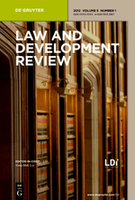
Law and Development Review
Transforming Legal Perspectives into Developmental SolutionsLaw and Development Review, ISSN 2194-6523, published by WALTER DE GRUYTER GMBH, stands as a vital scholarly outlet in the interdisciplinary nexus of law, development, and economics. Based in Germany, this journal seeks to catalyze rigorous discourse and research on the critical interactions between legal frameworks and developmental strategies, as indicated by its classification in the Q3 and Q4 quartiles across various relevant categories. With a convergence of scholarship from 2012 to 2024, it offers an invaluable platform for researchers and practitioners aspiring to engage with contemporary challenges in governance, social justice, and economic policy. Despite its relatively recent establishment, the journal's impact is evidenced by its positioning in Scopus rankings, showcasing its academic merit and relevance. While it operates under traditional access models, Law and Development Review remains committed to enriching the body of knowledge in its specialized fields, making it an essential resource for anyone invested in the interplay of law and development.

Asia Pacific Law Review
Exploring the Legal Landscape of the Asia PacificWelcome to the Asia Pacific Law Review, a prestigious academic journal published by Taylor & Francis Ltd that serves as a vital resource for scholars, practitioners, and students in the field of law. With its ISSN 1019-2557 and E-ISSN 1875-8444, this journal critically examines legal issues pertinent to the Asia Pacific region and promotes scholarly discourse. Recognized in the Q3 category for law by the 2023 category quartiles, the Asia Pacific Law Review stands out with a Scopus ranking of #574 out of 1025, placing it in the 44th percentile within the Social Sciences _ Law category. Spanning from 2008 to 2024, the journal aims to present innovative research, policy analyses, and significant case studies that illuminate the evolving legal landscape in the region. While the journal does not offer Open Access, it remains an essential platform for high-quality legal scholarship, contributing to the advancement of legal knowledge and practice in the Asia Pacific area.

GEORGE WASHINGTON LAW REVIEW
Connecting Scholars with Legal EvolutionThe George Washington Law Review, ISSN 0016-8076, published by George Washington University, stands as a leading academic journal in the field of law, distinguished by its prestigious Q1 category ranking in Law for 2023. Established as a pivotal platform for legal scholarship, the journal reflects a deep commitment to advancing legal discourse through the publication of rigorous, thought-provoking articles and analyses. The journal's impact is further underscored by its Scopus ranking, placing it in the 72nd percentile within the Social Sciences category for law, showcasing its relevance and influence in legal academia. While not an open-access journal, it contributes significantly to legal research and education, making it invaluable for scholars, practitioners, and students seeking to engage with contemporary legal issues. Its comprehensive coverage since 1976 ensures a wealth of resources dedicated to evolving legal thought and practice, solidifying its role as an essential resource within the legal community.

FORDHAM LAW REVIEW
Pioneering Insights for Legal MindsFORDHAM LAW REVIEW is a prestigious legal journal published by Fordham University, School of Law, based in the United States. Established to disseminate cutting-edge legal scholarship, this journal has consistently achieved an impactful standing within the field, evidenced by its category ranking as Q1 in Law for 2023 and its Scopus ranking of #428 out of 1025 in the Social Sciences Law category, placing it in the 58th percentile. The journal welcomes submissions across diverse legal topics, fostering discourse that advances both legal theory and practice. Although it does not currently offer open access options, the Fordham Law Review serves as a vital resource for scholars, practitioners, and students seeking insights into contemporary legal challenges and developments. With its rich publication history dating back to the converged years of 1973 through 2024, the journal continues to be a cornerstone for rigorous legal analysis and a platform for influencing the evolution of law.
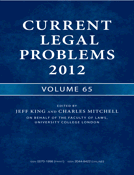
Current Legal Problems
Delving into the heart of today’s legal dilemmas.Current Legal Problems is a premier academic journal published by Oxford University Press, dedicated to advancing the field of law through critical analysis and interdisciplinary research. With an ISSN of 0070-1998 and an E-ISSN of 2044-8422, this journal has established itself as a vital resource for legal scholars and practitioners alike since its inception in 1983. Recognized with a Q1 category ranking in Law for 2023, it ranks notably in Scopus as #415 out of 1025, placing it in the 59th percentile, further underlining its influence and importance. The journal's scope encompasses contemporary legal issues, providing a platform for innovative legal thought and discussion. Although it does not follow an open access model, the journal remains accessible through both print and digital subscriptions, catering to a global audience from its base in Oxford, United Kingdom. Researchers, students, and legal professionals will find Current Legal Problems indispensable for staying informed about the latest legal developments and scholarly debates.
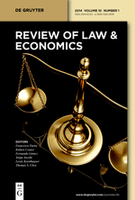
Review of Law & Economics
Exploring Innovative Perspectives in Legal and Economic Analysis.Review of Law & Economics, published by WALTER DE GRUYTER GMBH, serves as a pivotal platform in the intersecting realms of law and economics, with its open access policy initiated in 2016 to promote wider dissemination of research. Based in Germany, this journal aims to foster insightful discussions and innovative research that bridge the gap between legal frameworks and economic principles. With an impact factor reflected in its Q2 rank in Law and Q3 rank in Economics, Econometrics and Finance as per the 2023 category quartiles, it positions itself as a significant contributor to scholarly works in both fields. The journal's unique approach highlights a comprehensive analysis of legal issues through an economic lens, making it invaluable for researchers, professionals, and students alike. As it encompasses a broad spectrum of topics from regulatory analysis to market dynamics, the *Review of Law & Economics* continues to be a vital resource for those seeking to enhance their understanding and application of law in economic contexts, with converged years extending from 2005 to 2024.

International Environmental Agreements-Politics Law and Economics
Illuminating the complexities of international environmental treaties.International Environmental Agreements-Politics Law and Economics, published by SPRINGER, is a leading journal dedicated to exploring the intersection of economics, law, and political science as they relate to international environmental agreements. With impressively high rankings in its respective categories—Q1 in Economics and Econometrics, Law, and Political Science and International Relations—this journal serves as a critical platform for rigorous scholarly discourse, addressing pressing global challenges and fostering understanding among policymakers and academics alike. The journal is indexed with an E-ISSN of 1573-1553 and maintains a strong presence in Scopus, excelling in multiple disciplines (ranked #40 in Law, #39 in Political Science, and #128 in Economics). Despite being a subscription-based journal, its comprehensive analyses and innovative perspectives make it an invaluable resource for researchers, professionals, and students committed to advancing sustainable environmental governance. Established in 2003, the journal continues to contribute to the field with engaging content that encourages interdisciplinary collaboration and furthers the study of international environmental treaties.

World Competition
Navigating the Complexities of Global CompetitionWorld Competition is a distinguished academic journal published by KLUWER LAW INT, focusing on the dynamic interplay between law and economics. With its ISSN 1011-4548 and E-ISSN 1875-8436, the journal aims to disseminate high-quality research that explores competitive markets, regulatory frameworks, and economic theory, therefore making significant contributions to the fields of Economics and Law. Situated in the Netherlands, the journal is strategically positioned within a vibrant academic milieu, ranking in the upper quartiles of both categories - Q3 in Economics and Econometrics and Q2 in Law as of 2023. The journal serves as a vital platform for researchers, legal professionals, and students keen on understanding the complexities of competition policy and economic regulations. While it does not offer Open Access options, it remains committed to rigorous peer review and scholarly excellence, making it an essential resource for anyone interested in the evolving landscape of global competition law and economics. With converged years from 2016 to 2024, the journal reflects contemporary issues and trends, ensuring its relevance in today’s fast-paced academic environment.
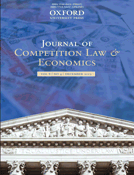
Journal of Competition Law & Economics
Unraveling the Threads of Competition and RegulationThe Journal of Competition Law & Economics, published by Oxford University Press, stands at the forefront of interdisciplinary scholarship, providing a vital platform for the analysis of competition law and economic theory. With its ISSN 1744-6414 and E-ISSN 1744-6422, this UK-based journal has gained significant recognition within the academic community, achieving a Q1 ranking in Law and a Q2 ranking in Economics and Econometrics as of 2023. This distinction highlights the journal's commitment to high-quality research, as evidenced by its Scopus rankings—placing it in the top 22% of Law journals and the top 56% of Economics journals. Covering a range of topics from antitrust regulation to economic impacts on market structures, the journal aims to bridge the gap between legal frameworks and economic principles, fostering a deeper understanding of their interplay. Scholars, practitioners, and students alike will find invaluable insights within its pages, enhancing their engagement with ongoing debates in these critical fields.